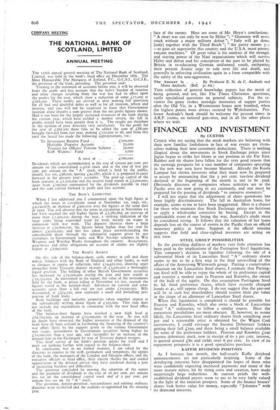FINANCE AND INVESTMENT
By CUSTOS
CYNICS who are saying that the stock markets are behaving with their now familiar foolishness in face of war events are them- selves making their now customary deductions. There is nothing illogical about the movements in Stock Exchange prices since Japan began to strike her blows at our position in the Far East. Rubber and tin shares have fallen for the very good reason that the earnings prospects for a vast number of companies operating in the new war area have become blurred. Already the Kuala Lumpur has shown investors what they must now be prepared to accept by announcing that the 5 per cent. tax-free dividend declared at the beginning of the month is not to be paid. Obviously directors of companies whose activities are in the Pacific area are now going to act cautiously, and one must be prepared for the passing of dividends " to conserve resources."
I will not argue that the adjustment of share quotations has been highly discriminatory. The fall in Australian loans, for example, seems to me to have been exaggerated. Here is a chance for those who maintain that Stock Exchange prices are fictitious to apply a wholesome corrective by buying. Except in the unthinkable event of our losing the war, Australia's credit must be considered strong. It follows that the valuation of her loans depends less on the course of events in the Pacific than on official monetary policy at home. Support at the official minima suggests that bold and clear-sighted investors are acting on this view.
STEEL GROUP POSSIBILITIES
In the prevailing dullness of markets very little attention has been paid to the implications of the Partington Steel liquidation. This company's decision to liquidate following the sale of a substantial block of its Lancashire Steel " A " ordinary shares seems to me to be a first step in the final unravelling of the affairs of the Armstrong Whitworth group. Putting a conservative valuation on the Lancashire Steel shares, I estimate that Parting- ton Steel will be able to repay the whole of its preference capital and transfer a modest sum to Pearson and Knowles, the owner of the bulk of the equity. On this assumption Partington Steel 6s. 8d. third preference shares, which have recently changed hands at 4s., still appear cheap. I do not suggest that the pay-out will be in cash but shareholders should receive their par value in the shape of an allotment of Lancashire Steel shares.
When this liquidation is completed it should be possible for Pearson and Knowles, which also owns a block of Lancashire Steel " A " ordinaries, to follow a similar course. Here the repayment possibilities are more obscure. If, however, as seems likely, the Lancashire Steel ordinary shares fetch something over par and a reasonable price is obtained for the Wigan Coal investments, I could envisage the Income Debenture holders getting their full Ltoo, and there being a small balance available for some of the preference holders. Pearson and Knowles Doc income debenture stock, now in receipt of its 5 per cent. interest, is quoted around £80 and yields over 6 per cent. In view of its repayment prospects it is a good speculative purchase.
KAFFIR DIVIDEND POSITION
As I forecast last month, the half-yearly Kaffir dividend announcements are not particularly inspiring. Some of the developing concerns have disappointed the hopes of those who were confidently expecting increased payments and many of the more mature mines, hit by rising costs and taxation, have made surprisingly large reductions. At current prices the well- established dividend payers seem to me to be very fairly valued in the light of the taxation prospect. Some of the finance houses' shares look better value for money, especially " Johnnies " with its diamond interests.






















 Previous page
Previous page